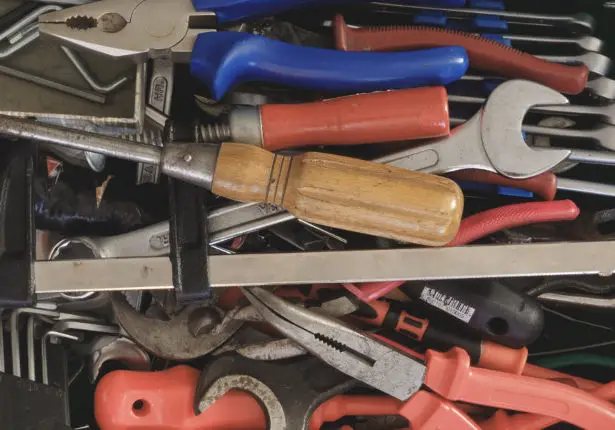Jonathan Dodd’s latest column. Guest opinion articles do not necessarily reflect the views of the publication. Ed
I do like a good tool. There’s something very satisfying with the idea that there’s a thing which will very simply do the job you want it to, without fuss, and in a way that doesn’t need complicated messing around and adjustments. The best tools are usually going to be good for several different kinds of job, like my trusty penknife, which is capable of dealing with fingernails, splinters, things stuck in teeth (discreetly), cutting, filing, screwing and unscrewing various types of screw, and so on. I can safely say that there’s never a day that goes by that I don’t get out my penknife and use it for something.
There are other tools I rather like. I bought an elegant box at a boot fair once, which contained a screwdriver handle, and about 100 different hexagonal fittings, for so many jobs I’ve never been able to count. It’s got extensions, and sockets, and everything fits into lots of neat labelled foam holes and channels, so it’s all snug and nothing falls out when you open the box. It’s one of my most treasured possessions. Another tool I own that I swear by, rather than at, is a clever little thing based on a magnifying glass on a metal stalk, with various adjustable arms and clamps. I can position something impossible to read, like one of those tiny watch batteries, so I can read the tiny engraved numbers that tell me what type it is.
I get to control some tiny part of the world
That magnifier is a godsend for me especially, with one wonky eye. It’s also very good for those difficult splinters, and other delicate work. I don’t need three hands either, because I can clamp something in position and let go. And there’s a light, which shines down beatifically on the object being scrutinised. In this way I get to control some tiny part of the world, which is a source of immense comfort to me, given that I have no control otherwise over any event or force that impinges on my life.
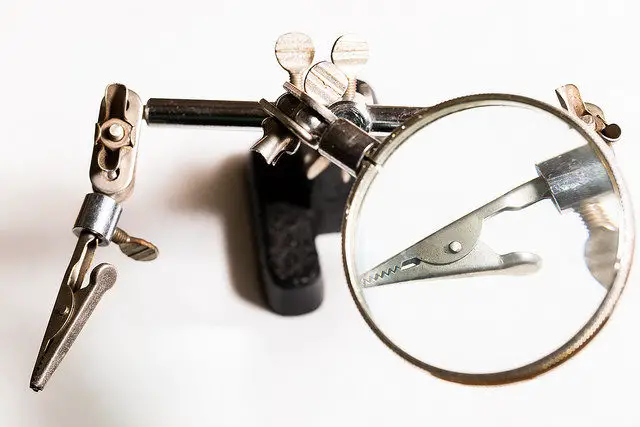
Every time I’m asked to go and do some job for someone, it’s always an exercise in judgement, deciding what tools I might need, either because they’ll obviously be needed, or because there could be some local difficulty, and it’s always better to have contingency tools rather than having to drive back home to fetch something, or interrupt the job and start again tomorrow. This is a good piece of training for the rest of life, to try to plan ahead, not just for what you expect, but also for the unexpected. There’s a fine balance to be struck between taking just enough and piling everything including the kitchen sink into whatever toolkit I’m assembling.
Fun, spiced by a little occasional anxiety
Occasionally, I know that I’m only going to need a small number of tools. The other day I bought a shed. The deal was that I would go and dismantle it, then remove it in its constituent parts, carry it home on top of my car, and then remantle it in my garden. I took very few tools for that job, and the time was mostly taken up in working out how it was put together originally, so I could take it apart without damaging it. It was hard work, and quite a lot of fun, spiced by a little occasional anxiety.
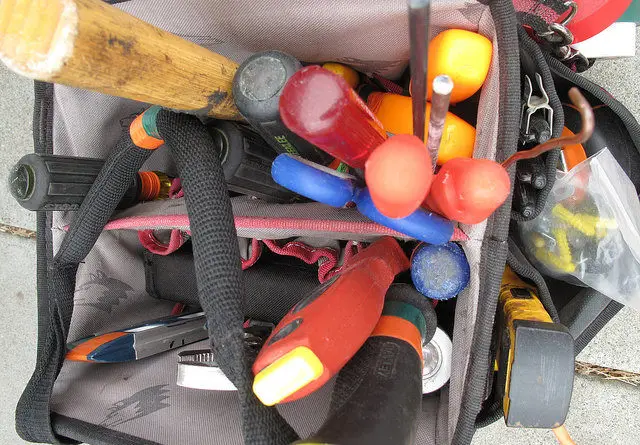
One of these moments involved the roof. After prising the two halves of the roof apart very carefully without ripping the roofing felt, they needed to be slid gently down the slope one at a time, slowly enough not to slide right off, and then I had to get under the overhang and pull the first one down to the ground. At that moment I had no idea how heavy they were going to be, so I wasn’t sure how much carrying was going to happen, or whether it was going to need a rather quick jump out of the way, followed by an assessment of how badly damaged it would be. Luckily, it all went well.
I didn’t want to make 16 journeys
There was another complex moment, when I put together the roof rack so I could load it up and tie the panels on. I had to decide just how much I could get away with, given the weight, and any wind I might encounter, and how hilly or bumpy the journey might be. There were 16 panels and various bits, so I didn’t want to make 16 journeys either. The first journey was quite white-knuckled, but I managed to do it all in three trips. Now it’s in lots of pieces in my back garden, waiting for me to reverse the whole job and put it up in the corner. It’s going to look very splendid, and I might get it finished before it rains again. We were very lucky to move during such good weather, and the rain we just had wasn’t accompanied by fierce winds, so everything stayed under tarpaulins and didn’t get wet.

All of this was very hard work, and involved moving every part of the shed from one place to another about four times. I had to get it from one end of a big garden to the other, then I had to get it through a gate without letting the resident dogs escape, then I had to get it through another gate, then I had to prop it all up next to where I could put the car, prior to loading. The previous shed owner was most grateful that I treated it carefully and cleared up after myself. They said they were glad that it was bought by someone who obviously understands sheds and would give it a good home.
Telephone sanitisers or documentary-film-makers
I didn’t mind doing all that work, because I don’t suffer from that very modern malaise that seems to think that if a job requires effort, it should be avoided and complained about and done in as fast and slipshod way as possible. Maybe I’m being unfair to modern people. Perhaps humans have always been like that. I do remember once, during another period without work, getting some shift work in a warehouse, at night. It was a horrible job, involving unwrapping pallets of VHS tapes, opening the boxes and putting stickers on all the tapes and their packets, then reassembling and rewrapping the pallets. For eight hours, every night.
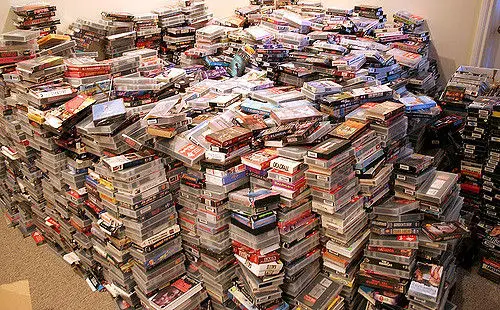
It could have been miserable and backbreaking and interminable. Luckily most of us poor unemployed people were ex-IT workers, and solicitors, and bank managers, and middle-managers. I couldn’t identify any telephone sanitisers or documentary-film-makers. We decided to make assembly lines in two teams, and see who finished first. And we sang, and we made ribald remarks at each other, and we ran about from place to place, hurrying. Amazingly, each of those shifts went past in a flash, and we all felt like steadfast friends by the end of that job. And, sadly, we all disappeared back into our respective burrows afterwards. But for a while, it was almost fun, and it became a lesson in how to improve the pleasure of doing things by doing them carefully and fast.
That barn-raising scene in Witness
I’m not going to throw my shed up. I’ll spend far more time preparing the ground and remaking the base and making it level and solid, than I will screwing the shed panels back together again and fixing the roofing felt down. Then I’ll bathe in a warm glow of achievement when I put everything in it and start working on the garden, without all that clobber all over the place. This has been another not very good week, but at least I will be able to remember the shed-raising as well as the other, less pleasant stuff. The previous owners and I were talking over tea and coffee about how I should have a party once it’s up, or maybe invite some friends round to help erect it, and I imagined my very own version of that barn-raising scene in Witness, complete with Harrison Ford, and the lovely music by Maurice Jarre. Except for a two-metre-square shed, rather than an actual barn.
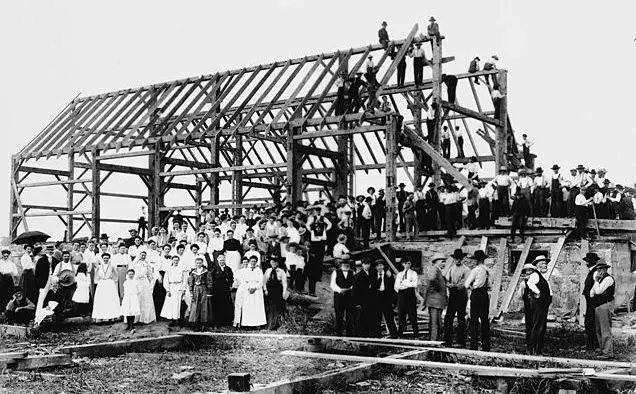
I rather like this sort of careful work, whether it’s large or small. There’s a precision, and a logic to it, and a satisfaction in doing everything with care and in order. It’s the same for me when I get to do unpicking. Sometimes pieces of clothing or material have to be taken apart, so they can be adapted or altered, or turned into something else entirely. To do this properly, there’s a very specific tool called an ‘unpicker’. All unpickers are exactly the same, there isn’t an alternative version, because these unpickers are perfect. There’s a thin pointed spike, which you worm in between the material and the cotton thread, with a sharp blade at the top, so you can cut the cotton but not damage the material, and there’s usually another shorter piece of metal with a small bead on the end, to stop you cutting yourself, because you don’t want to get blood all over that nice clean cloth.
There’s absolutely no guilt involved
I love unpicking. It could almost be one of my guilty pleasures, although there’s absolutely no guilt involved. Unpicking usually involves removing pieces of material from clothes, after buying and before being worn. It turns out that some pieces of clothing seen to require unnecessary straps and buttons, or small pockets in unlikely places. There are often pieces of cloth that require you to roll up your sleeves partially, so you can bunch and button up the rolled material for no good reason. I’ve never seen anyone actually do that. You end up with a button visible, and a small strap hanging down inside the sleeve, which gets in the way of ironing a smooth crease. So I volunteer regularly for unpicking duties, and it’s one of my great pleasures. Men’s clothes don’t have unnecessary things on, apart from those ridiculous pockets around the knees of too-long shorts. Women’s clothing has lots of unnecessary bits on, which you would think they could leave off and charge less, but it doesn’t seem to work that way.
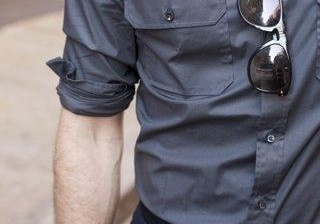
I take great pleasure in wielding my small unpicker, and I love the simplicity and perfection of its design, and the challenge of never catching any threads from the material. I’ve never seen any posh unpickers, so they’re all more-or-less the same price, rather like the lasers for CD players, all being identical, although the boxes they’re placed in are wildly different. There are some older versions, all ivory and mother-of-pearl, and there are some new ones that have fancy handles, but they all work in exactly the same way.
I’d just like to sit and unpick all day
I thought about offering my services as a professional unpicker, but I somehow don’t think there would be a way to make it pay vast sums of money. I wouldn’t be able to delegate the work to others either, because I’d just like to sit and unpick all day. That would be like going to heaven, without having to do all that messy dying beforehand.
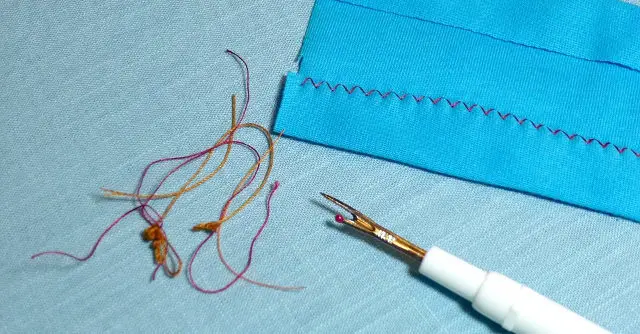
But somehow I doubt I’ll end up doing that.
If you have been, thank you for reading this.
Image: libreshot under CC BY 2.0
Image: jlodder under CC BY 2.0
Image: dblfineart under CC BY 2.0
Image: Riley under CC BY 2.0
Image: makelessnoise under CC BY 2.0
Image: Public Domain
Image: Quora under CC BY 2.0
Image: pixabay under CC BY 2.0

